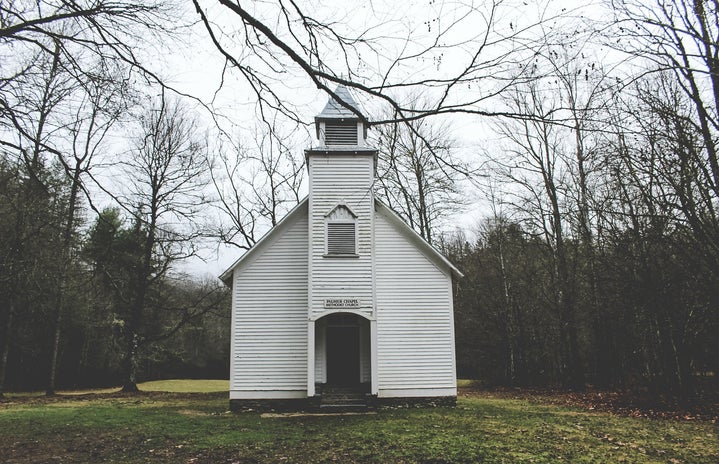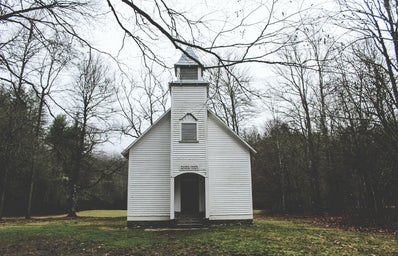Content Warning: This album references sensitive topics including abuse, drugs, murder, and cannibalism.
Back in May of 2022, 24-year-old American singer-songwriter Hayden Anhedönia released her debut album, Preacher’s Daughter. Over the duration of an hour and fifteen minutes, the listener is told an intense, haunting story of the demise of the fictional character Ethel Cain, which is also the stage name Anhedönia publicly goes by.
The body of work practically drips with the Southern Gothic aesthetic, combining genres of alt/indie, rock, and country throughout the tracks. This album tells the story of 20-year-old Ethel, the outcast daughter of a preacher from a small southern town. Her father died when she was a child, so she lives with her mother and grandmother, yet decides to run away shortly before her 21st birthday. Throughout the album, we witness Ethel struggle immensely with the idealization of the American dream, lost love, domestic abuse, exploitation, and her own sanity.
Anhedönia told Billboard, “I like to think of this album as a cautionary tale of what would happen if you don’t free yourself from these imaginary chains, in terms of religion, family and expectation.” Anhedönia left her Southern Baptist hometown of Perry, Florida at 18, and came out as a trans woman, legally changing her name at 20. She considers Ethel to be a mirrored version of herself gone wrong, someone who never overcame their hardships. Anhedönia makes it clear that the point of this piece is about intergenerational relationships and how we all tie back to our roots, and in Ethel’s case she will always be the preacher’s daughter.
Now that you have some background, let me tell you the entire story of Ethel Cain, song by song.
“Family Tree (intro)”
The first track begins with a muffled audio of what sounds like a man delivering a sermon; one could assume that this is a memory of her father. In a haunting reverberating tone, Ethel sings the premise of the album: “Jesus can always reject his father / but he cannot escape his mother’s blood.” In what appears to be a musing to herself, Ethel seemingly envies Jesus for his ability to deny his father’s claim over him, as she will never be able to deny her title of the preacher’s daughter.
Mary, however, is someone that Jesus cannot deny, the same way Ethel feels about the matrilineal line that she lives with. There also exists a slight foreshadowing in this line. Mary bleeds because she is mortal, the same way Ethel will when she eventually meets her end at the finale of this story.
“American Teenager”
Completely switching gears, next is the only pop track of the album, the upbeat anthem “American Teenager.” While sonically it’s a peppy song, the lyrics consist of Ethel turning to alcohol to mourn the loss of her first love, Willoughby, while trying to lead her deceased father’s congregation.
As she matures in her late teens, she realizes that the American dream is realistically unachievable, and too much of her youth is spent pining over a falsehood. She also comments on the pressure put on the youth to join the military: “The neighbor’s brother came home in a box / But he wanted to go, so maybe it was his fault/ Another red heart taken by the American dream.”
Ironically, this leading single made it onto former president Barack Obama’s list for top songs of the year.
“A house in Nebraska”
A true standout on the album, “A House In Nebraska” is a gut-wrenching eight-minute ballad further grieving over Willoughby leaving her. This house is not actually in Nebraska, but rather an abandoned home in their town where she and her lover would meet.
This song begins to explore Ethel’s romanticization of moving further west to escape her old life. “I saw Nebraska as the center of America, a wide open expanse, an open wheat field that just went on forever and ever… It’s heaven on earth — you’ll never be bothered again,” Hayden told W Magazine when describing the song that started the entire project of Preacher’s Daughter.
“Western Nights”
This song is a gorgeous ode to Ethel’s new boyfriend, Logan, and her dedication to staying with him through any hardship. Unfortunately, Logan is violent and controlling, yet Ethel remains convinced that her time with him is what freedom must feel like, as she’s still stuck in her hometown.
“family tree”
Following the death of Logan in a shootout, Ethel is on the run and finally leaves her hometown in Alabama. In her travels she thinks often of her father, switching between referring to him as the preacher and her daddy. This song is chock full of religious metaphor and imagery, from being bathed clean in a river, to turning into a woman through offering to a man, and all roads leading back to a chapel.
“hard times”
Here, we learn in greater detail about the complicated relationship Ethel has with her father due to the abuse she endured from him as a child. She recalls moments from her childhood through a more knowledgeable lens, and the pain she feels in trying to separate the preacher whom she admired and her father who hurt her. All alone and exhausted, she sings over and over how she wishes to let him go all these years after his death.
“Thoroughfare”
Enter Act II of the album. Ethel ends up in Texas, where she meets the enticing Isaiah, who offers her a ride with him to California. Along their road trip, they become romantically involved, and Ethel finally feels that she has met a good man that will set her free.
At almost ten minutes long, this song is a gorgeous combination of country, folk, and rock, with lyrics that further establish Ethel’s romanticization of “The West,” a dream now within reach.
“Gibson Girl”
Yet, like almost every man in her life, Isaiah hurts Ethel by taking advantage of her desperation and naivety. In California, he begins to exploit Ethel, who now lives in a drug-induced haze for his illicit business.
Ethel, in her clouded state of mind, finds it empowering to deny her strict religious upbringing by being promiscuous and desired. The song is incredibly sultry in its arrangement, showing Ethel’s view of the situation. However, she is ultimately still a victim of a different system of domination.
“Ptolemaea”
Have you ever been genuinely scared by a song? This one will do it.
“Ptolemaea” is the ninth and deepest circle of Hell from Dante’s Inferno, where traitors are sent to suffer for eternity. In this terrifying tune, we watch Ethel struggle with guilt for rejecting her family and their values and suffer from her murderous boyfriend’s betrayal that is encroaching on her life.
Objectively, there has never been a better song to scream along to. Headphone users, you’ve been warned.
“August Underground”
In this completely instrumental track, we hear only menacing crooning and warped bass as Ethel accepts her fate, and is killed by Isaiah. The song gets its title after the horror snuff film of the same name.
“televangelism”
The second purely instrumental track of this album immediately follows “August Underground,” yet sonically could not be more different. A beautiful piano piece improvised by Hayden plays alongside ambient noises, signifying Ethel’s ascension into Heaven and the end of her suffering.
“sun bleached flies”
What I am dubbing to be the most beautiful song of the year, “Sun Bleached Flies” is Ethel reflecting on her life in Heaven and letting go of all the trauma she held with her mortality.
Even though her religious upbringing had a hand in where she ended up, she still finds comfort in its imagery and familiarity. She thinks fondly of her family left behind in Alabama and ultimately thinks back to her “house in Nebraska” with Willoughby, who she never stopped loving.
“strangers”
From death, Ethel curses Isaiah for her body that will never be found. In the final verses of the album we hear Ethel issue forgiveness to an unknown person, confusing the listener on whether she is making peace with her father, Isaiah, or both.
But, as the song closes we realize Ethel has been singing to her mother, whom she sweetly tells not to cry, and that she will be waiting patiently for their reunion in the afterlife.
Final remarks
Well, there you go. The story of Ethel Cain. Even though her chapter is over, Anhedönia has repeatedly said that Preacher’s Daughter is only part one of a trilogy. The second and third albums will each focus on the story of Ethel’s mother, and then grandmother, going back through the family tree to further examine how intergenerational relationships affect our fate.
While I don’t think this background knowledge is necessary for enjoying the album, going through the lore that Hayden has published about her work has been a truly interesting deep dive into the mind of an up-and-coming new artist that everyone should be on the lookout for.
If you or someone you know is experiencing domestic abuse, call 911 or the National Domestic Violence Hotline at 1(800) 799-SAFE (7233) or visit thehotline.org


